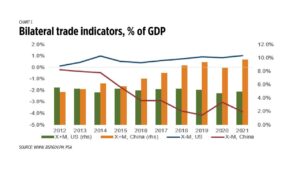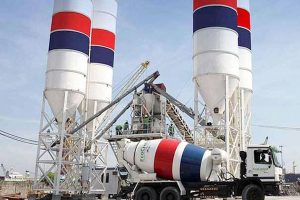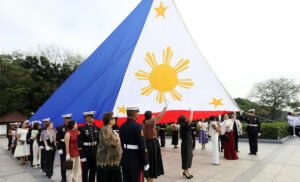Friend to all, enemy to none

(I am pleased to share with readers a post that Christine Tang and I wrote for Globalsource Partners subscribers [globalsourcepartners.com], released Jan. 11. Globalsource Partners is a New York based network of independent analysts providing macro and political risk analysis to subscribers, mostly international banks and fund managers.)
Ever since Ferdinand Marcos, Jr. came into office in July last year, his foreign affairs team has been busily working at re-centering Philippine foreign policy after the extreme pro-US then pro-China stances of the previous two administrations. In his words, President Marcos defined his foreign policy as one where the Philippines is “a friend to all and an enemy to none.”
To recall, the Aquino administration (2010-16) brought China to international arbitral court in 2014 over disputed waters in the West Philippine Sea/South China Sea (WPS/SCS). Although the Philippines won the case, the Duterte administration (2016-2022) opted to set the issue aside in its desire to encourage more Chinese investments in the country, especially in infrastructure. Nonetheless, this has not stopped government from issuing hundreds of diplomatic protests against Chinese activities in the WPS/SCS.
So far, the Marcos administration is managing well the difficult balancing act of reestablishing close ties with the US, including strengthening the two countries’ military alliance, while reassuring China that it continues to value its relationship which, both countries have emphasized, goes beyond maritime issues.
At the topmost level, President Marcos has met with US President Joe Biden at the sidelines of the UN General Assembly in New York in September last year and with Chinese President Xi Jinping at the sidelines of the Asia-Pacific Economic Cooperation (APEC) Summit in Thailand in November. Last week, he embarked on a state visit to China, his first outside ASEAN, describing the trip as a “good start” and the discussions “fruitful.” The President brought back with him 14 signed “cooperation documents” covering a broad range of sectors from agriculture, education, energy, environment, infrastructure, science and technology, trade, to people-to-people exchanges. He reported securing $22.8 billion worth of investment pledges and $2.1 billion worth of trade purchase intentions.
Will the Marcos administration, caught between two powers suspicious of each other, be able to get what it wants, i.e., on one hand, US protection against Chinese aggression in the WPS/SCS, and, on the other hand, expanding trade and investment flows with China? For now, the hope is that heightened US-China tensions do not escalate to the point that they compel small countries in the region to a “somos o no somos” (as the Trump Administration was starting to do with its 5G telco/security strategy) which would be most costly especially for the Philippines in many ways.
In the meantime, playing the “friend to all” card could bring not only direct economic gains in the short-term but, through higher level communication lines, avoid more untoward incidents in the disputed waters and in time, bring discussions on joint oil and gas development projects in the WPS/SCS beyond the drawing board. Too, following China’s reopening and exit from zero COVID policy, the Philippines stands to benefit from (1.) an expected resurgence in Chinese tourists, (2.) improved supply chains, and, (3.) a likely revival/continuation of projects, both public and private, that were interrupted by the pandemic.
Unclear yet are prospects for the online gaming industry (POGO) which China frowns on. Locally, the sector has come under heightened scrutiny recently due to related kidnap-for-ransom and human trafficking crimes as well as suspicions of money laundering activities and associated risk of blacklisting by the Financial Action Task Force’s (FATF), with calls for government to ban the activity coming from some senators, finance officials, civil society, and the business sector.
Below we see in charts the economic relations between the Philippines and the US and China.
Because of limitations in recording sources of remittances, BSP (Bangko Sentral ng Pilipinas) data show the US accounting for around 40% of the annual inflows. Survey data nevertheless show the importance of Asian countries as destinations for overseas workers, accounting for over 70% of cash remittances in the 2019 survey. Hong Kong is the third largest employer in the region, accounting for 7.4% of the 2.2 million workers surveyed in 2019.
Romeo L. Bernardo was finance undersecretary from 1990-96. He is co-founder, trustee/director of the Foundation for Economic Freedom. He also serves as a board director in leading companies in banking and financial services, telecommunication, energy, food and beverage, education, real estate, and others.




